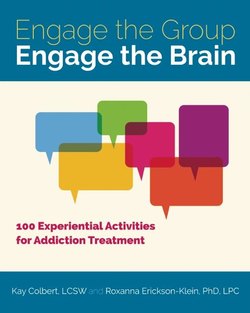Читать книгу Engage the Group, Engage the Brain - Kay Colbert - Страница 13
На сайте Литреса книга снята с продажи.
ОглавлениеSelf-Acceptance: Inventory with Unconditional Valuing of Self
Addiction is a disorder that occurs as a result of a complex interplay of biological and genetic predispositions, coupled with environmental factors and psychosocial circumstances. Modern neuroscience shows that people with addiction and compulsive behaviors experience strong cravings that can override the rational, reflective, decision-making parts of the brain. This can explain why people with addiction often make impulsive and destructive choices in their lives that hurt themselves and the ones they love. Individuals in early recovery often have strong feelings of regret, shame, and guilt about things they have done in the past. Self-esteem and sense of self are common casualties.
Activities in this section promote an open honest self-inventory and a willingness to accept one’s own history. We encourage examining the past and assessing what was painful and what was of value. Stressed in the assignments is the expectation that participants will be able to find strengths. Those very strengths are witnessed by arrival in a setting that invites recovery, despite all of the trials and hardships that may have been endured on the journey.
Roxanna: I recognize a strong need for people to have the opportunity to tell their story. As a Registered Nurse for many years, I learned patients do better if you listen to the entire story they offer rather than making assessments based on what is evidentially related to clinical symptoms. Sometimes the stories seem disjointed or irrelevant, and yet it is the internal connections that are the most relevant information of all.
While some stories seem to support tragic sequences that understandably lead to misfortune and poor life choices, other stories are completely obtuse. One adolescent with serious Obsessive Compulsive Disorder explained that a teacher had used the word decorum in the context of a class lecture. She attributed the teacher’s use of that uncommon word to have triggered a series of life changes and lost ability to function normally. Acceptance of that strange logic was essential to her sense of being listened to, heard, respected, and treated with dignity. The validity of her commitment to the causality of her condition was not central to her health—being respected and listened to was. Once she was given the opportunity to express this association, and her story was treated with dignity, she was free to make healthier associations. Treatment and support enabled building of associations congruent with a functional future.
Kay: In the recovery community, we talk about how people with addiction are trying unsuccessfully to fill an empty hole in their soul with alcohol or other drugs. I have observed that frequently newly sober clients still feel a general sense of lack in themselves. They must now deal with a variety of uncomfortable feelings without the numbing qualities of alcohol or other drugs. David Loy, a professor of Buddhist and comparative philosophy, speaks eloquently on the sense of self and the “sense of lack” people can feel and the desire to change this by grasping at things to make them feel better, such as getting high. Those with addiction often have a sense of something not being quite right with themselves, and they look to substances to feel more secure. In recovery, one challenge is to reconstruct a healthy sense of self and to develop self-compassion and self-acceptance.
“Accept your yesterdays unconditionally. Accept your tomorrows very selectively.”
DR. KRISTINA ERICKSON
